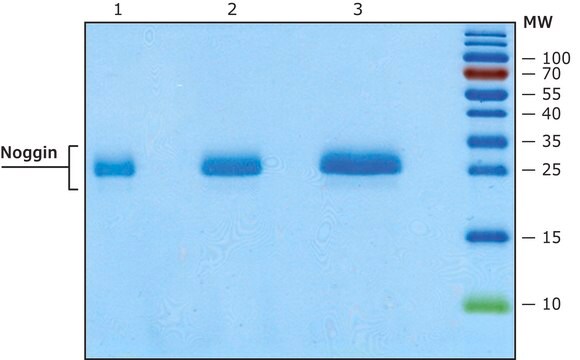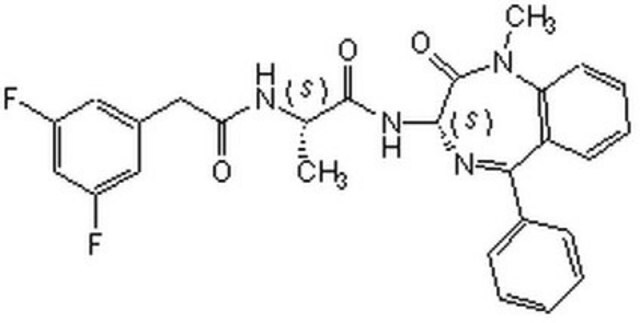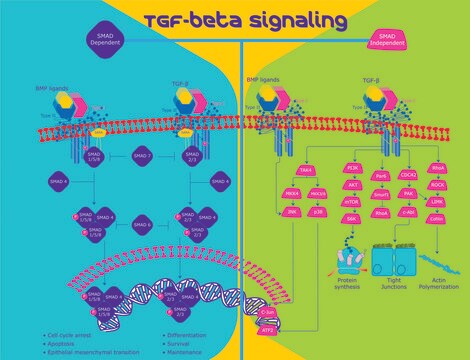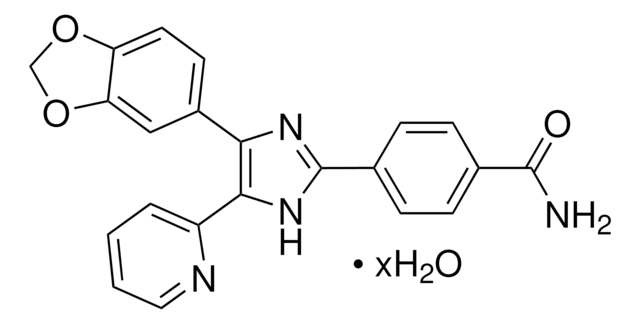SRP4675
Noggin human
recombinant, expressed in E. coli, ≥95% (SDS-PAGE), ≥95% (HPLC)
Sinonimo/i:
NOG, SYM1, SYNS1
Autenticatiper visualizzare i prezzi riservati alla tua organizzazione & contrattuali
About This Item
Prodotti consigliati
Descrizione generale
Noggin (NOG) belongs to a group of diffusible proteins which bind to ligands of the TGF (transforming growth factor)-β family and regulate their activity by inhibiting their access to signaling receptors. The protein is secreted and exists as a disulfide-linked homodimer. The gene NOG is mapped to human chromosome 17q22. Recombinant human Noggin is a 23.1kDa non-disulfide-linked homodimer consisting of a total of 206 amino acid residues.
Applicazioni
Noggin (NOG) human has been used as a BMP antagonist.
Azioni biochim/fisiol
Noggin (NOG) was originally identified as a BMP-4 (bone morphogenetic protein 4) antagonist whose action is critical for proper formation of the head and other dorsal structures. Consequently, Noggin has been shown to modulate the activities of other BMPs including BMP-2,-7,-13, and -14. Transgenic mice over-expressing Noggin in mature osteoblasts display impaired osteoblastic differentiation, reduced bone formation, and severe osteoporosis. In mice, loss of noggin causes malformations in skeletal system. In mouse noggin is associated with tissue patterning by participating in cell differentiation, cell proliferation and apoptosis in the developing embryo. Mutations in the gene is associated with several disorders, including proximal symphalangism, multiple synostoses, tarsal/carpal coalition syndrome and Teunissen–Cremers syndrome. It is a gene which is also linked with conductive hearing loss. Polymorphism in the gene might be associated with reduced risk of nonsyndromic cleft lip with or without cleft palate (NSCLP).
Stato fisico
Lyophilized without any additives.
Ricostituzione
Centrifuge the vial prior to opening. Avoid freeze-thaw cycles.
Reconstitute in water to a concentration of 0.1 to 1.0 mg/mL. Note: Due to solubility reasons the protein should be kept at low pH. This solution can then be diluted into other aqueous buffers.
Codice della classe di stoccaggio
11 - Combustible Solids
Classe di pericolosità dell'acqua (WGK)
WGK 3
Punto d’infiammabilità (°F)
Not applicable
Punto d’infiammabilità (°C)
Not applicable
Certificati d'analisi (COA)
Cerca il Certificati d'analisi (COA) digitando il numero di lotto/batch corrispondente. I numeri di lotto o di batch sono stampati sull'etichetta dei prodotti dopo la parola ‘Lotto’ o ‘Batch’.
Possiedi già questo prodotto?
I documenti relativi ai prodotti acquistati recentemente sono disponibili nell’Archivio dei documenti.
I clienti hanno visto anche
Association between NOGGIN and SPRY2 polymorphisms and nonsyndromic cleft lip with or without cleft palate.
Song T
American Journal of Medical Genetics. Part A, 167A, 137-141 (2015)
Nonsyndromic cleft lip with or without cleft palate: Increased burden of rare variants within Gremlin-1, a component of the bone morphogenetic protein 4 pathway.
Al Chawa T
Birth Defects Research Part A: Clinical and Molecular Teratology, 100, 493-498 (2014)
Impaired osteoblastic differentiation, reduced bone formation, and severe osteoporosis in noggin-overexpressing mice.
Wu XB
The Journal of Clinical Investigation, 115, 1390-1390 (2005)
The WNT inhibitor Dickkopf 1 and bone morphogenetic protein 4 rescue adipogenesis in hypertrophic obesity in humans.
Gustafson B and Smith U
Diabetes, 61, 1217-1224 (2012)
The expression patterns of gremlin 1 and noggin in normal adult and tumor tissues.
Laurila R
International Journal of Clinical and Experimental Pathology, 6, 1400-1408 (2013)
Articoli
rganoid culture products to generate tissue and stem cell derived 3D brain, intestinal, gut, lung and cancer tumor organoid models.
Il team dei nostri ricercatori vanta grande esperienza in tutte le aree della ricerca quali Life Science, scienza dei materiali, sintesi chimica, cromatografia, discipline analitiche, ecc..
Contatta l'Assistenza Tecnica.






![[Leu15]-Gastrin I human ≥95% (HPLC)](/deepweb/assets/sigmaaldrich/product/structures/153/342/d4cb3dd7-13f1-46cf-8d1f-3907a5de7a83/640/d4cb3dd7-13f1-46cf-8d1f-3907a5de7a83.png)




